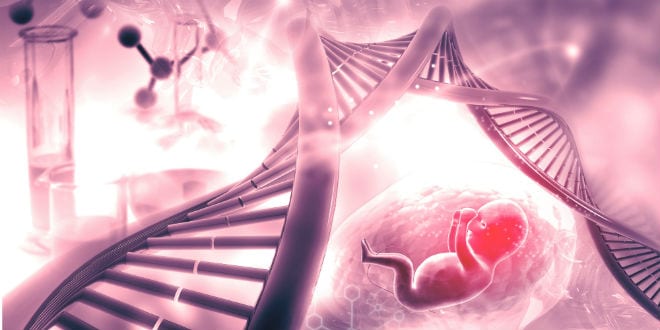Every parent-to-be dreams of having a perfect baby, and many even taken this for granted. But in pregnancies, so many things – especially their combinations of genes – can go wrong and lead to disappointment and concern. Every healthy baby is a miracle.
While some couples would not consider an abortion in any case, others consider ending the pregnancy if something is seriously wrong. To reduce the risks of delivering a defective baby, couples are willing to undergo pain and spend considerable sums to monitor the fetus’s condition.
Now, thanks to ground-breaking research at Tel Aviv University, this could become painless and easy. A simple blood test using samples from both the mother and the father could detect innumerable diseases caused by minuscule impairments in the fetal genome. The research was just published in the journal Genome Research under the title Bayesian-based noninvasive prenatal diagnosis of single-gene disorders.”
The test could make it possible for parents to learn about the health of their fetus as early as 11 weeks into the 40-week pregnancy. The test sequences small amounts of DNA in the parents’ blood. A computer algorithm based on the results of the sequencing would then produce a “map” of the fetal genome and predict mutations with 99% or higher accuracy, depending on the mutation type.
Prof. Noam Shomron of TAU’s Sackler School of Medicine led the research, which was conducted by TAU graduate student Tom Rabinowitz with Avital Polsky, Artem Danilevsky, Guy Shapira and Chen Raff – all from Shomron’s lab. The study is a collaboration with Dr. David Golan of the Technion-Israel Institute of Technology in Haifa and Prof. Lina Basel-Salmon and Dr. Reut Tomashov-Matar of the Rabin Medical Center-Beilinson Campus in Petah Tikva.
“Noninvasive prenatal tests are already available for chromosome disorders such as Down syndrome,” Shomron said. Some mothers undergo invasive testing such as chorionic villus sampling (CVS) and amniocentesis to detect certain fetal genetic abnormalities. Both procedures increase the risk for miscarriage. Typically, CVS is carried at 10 to 12 weeks of pregnancy, and amniocentesis is done at 15 to 18 weeks’ gestation.
“Our new procedure is based on fetal DNA fragments that circulate freely in maternal blood and bears only a minimal risk for the mother and fetus compared with such invasive techniques as the amniotic fluid test. We will now be able to identify numerous mutations and diseases in a safe and simple procedure available at the doctor’s office,” the researchers said.
“The genetic mechanism behind Down syndrome affects a very large portion of the genome and therefore is easier to detect,” Shomron explained. “We performed upgraded, non-invasive fetal genotyping, using a novel approach and an improved algorithm, to detect many other diseases that are caused by smaller parts of the genome. This is like looking at a map of the world and noticing not only that a continent is missing, but also that a single house is missing. The practical applications are endless – a single blood test could detect a wide range of genetic diseases such as Tay-Sachs disease, cystic fibrosis and many others.”
There are about 7,000 genes in the human genome, with specific mutations that cause genetic diseases, some of which have serious implications for the health of the fetus, said Shomron. “These diseases are called monogenic diseases, because they are caused by a defect in one specific gene. Known examples are Tay-Sachs and cystic fibrosis, but most monogenic diseases are very rare. Thousands of mutations are present at the level of complete chromosomes or sub-regions of chromosomes that include millions of nucleotides of fetal DNA.
Shomron and colleagues tested blood samples from three families at Rabin Medical Center with fetuses in the 11th week of pregnancy. They extracted maternal and paternal DNA from their white blood cells and fetal DNA from a placental cell sample. They also removed circulating cell-free fetal DNA from the maternal blood.
“In recent years, a new, non-invasive technology called NIPD (non-invasive parental diagnosis) has been introduced to diagnose genetic syndromes in the fetus using a blood test from the mother as early as 10 to 12 weeks of gestation. Chromosomal abnormalities, we have sought to develop a method that will allow the detection of mutations at the single gene level, which allows for dozens of times higher resolution than the existing ones,” said researcher Rabinowitz.

“We sequenced all these DNA samples and created a computer algorithm that utilizes the parental DNA as well as the cell-free fetal DNA to reconstruct the fetal genome and predict mutations,” concluded Shomron. “We compared our predictions to the true fetal DNA originating from the placenta. Our model is the first to predict small inherited insertions and deletions. The method described can serve as a general framework for non-invasive prenatal diagnoses.”
The researchers are now working on further improving the accuracy of the method and extending it to detect even more types of mutations. “We believe that in the future, every pregnant woman will be able to undergo an easy and accessible examination based on the innovative method, very early in pregnancy, which will help parents and doctors resolve premature termination of pregnancy, in many cases in which the fetus is affected.”
Source: Israel in the News

